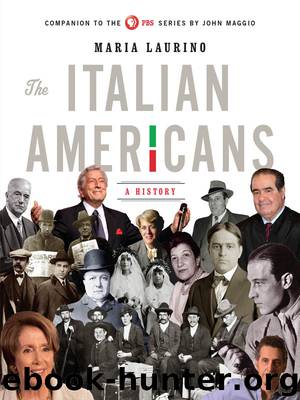The Italian Americans by Maria Laurino

Author:Maria Laurino
Language: eng
Format: epub
Publisher: W. W. Norton & Company
Published: 2014-11-19T16:00:00+00:00
It would be impossible to understand the adulation of the Italian-American masses for Mussolini throughout the 1930s without recognizing America’s initial enthusiasm for the dictator. After the “March on Rome” in October of 1922, in which hundreds of his followers demanded a Fascist government and the weak King Victor Emmanuel III relented, America was quick to celebrate Mussolini as a winner. Politicians, journalists, and businessmen believed that Mussolini’s new political program, with its brutal intolerance of strikes taking place throughout the country, would restore order and stem the tide of the growing Bolshevist threat.
Americans lapped up Mussolini’s rhetoric about restoring the greatness of the Roman Empire. Even the name of his party—the fasces, a bundle of wheat bound to an ax—symbolized Roman authority. Finally someone would impose structure on an undisciplined nation and make the trains run on time.
The magazine of Middle America, the Saturday Evening Post, praised Mussolini and serialized the dictator’s autobiography in 1928. The Chicago Tribune declared that Fascism represented “the most striking and successful attempt of the middle classes to meet the tide of revolutionary socialism.” Reporters like New York Times correspondent Anne O’Hare McCormick worked themselves up to a high pitch of adulation: “It is easy enough for Americans to comprehend the Fascisti. Direct action is intelligible in any language. A nation that thrilled to the Vigilantes and the Rough Riders rises to Mussolini and his Black Shirt army. They have done more to make Italy understood in the United States than three million Italians coming over to dig ditches.”
“A land of mothers is a land of sons, and the mothers of Italy have great power over their sons,” continued McCormick. “Mussolini himself is the son of a strong peasant mother, to whose devotion and self-sacrifice he is said to owe much. Women understand the old-fashioned, masterful sort of government which he re-establishes. They rally to the old-fashioned hierarchies, of religion, authority, obedience which he restores.”
The most nefarious aspects of Mussolini’s regime were still a decade away, but each of these journalists in the twenties turned their backs on the loss of Italy’s free press, its wrathful nationalism, the extreme violence of the Blackshirts who beat their opponents to death (or at a minimum beat and force-fed large doses of castor oil to any who showed disobedience), and the placing of faith in a man who radically and opportunistically changed his political positions.
Mussolini had been a fervent socialist and atheist journalist who denounced capitalists like John D. Rockefeller and J. P. Morgan in his articles about America. The young Mussolini wrote about the millworkers strike in Lawrence, Massachusetts, sympathizing with the workers and condemning the “crimes of capitalism.” Once in power, however, he abandoned these positions, brutally suppressing strikes and embracing and winning the support of American capitalists and the Vatican. Eventually, the head of J. P. Morgan bank would become one of his most influential backers. The humorist Will Rogers, after interviewing Mussolini for the Saturday Evening Post, affectionately explained, “Dictator form of government is the greatest form of government; that is, if you have the right Dictator.
Download
This site does not store any files on its server. We only index and link to content provided by other sites. Please contact the content providers to delete copyright contents if any and email us, we'll remove relevant links or contents immediately.
| African-American Studies | Asian American Studies |
| Disabled | Ethnic Studies |
| Hispanic American Studies | LGBT |
| Minority Studies | Native American Studies |
Cecilia; Or, Memoirs of an Heiress — Volume 1 by Fanny Burney(32536)
Cecilia; Or, Memoirs of an Heiress — Volume 2 by Fanny Burney(31934)
Cecilia; Or, Memoirs of an Heiress — Volume 3 by Fanny Burney(31925)
The Great Music City by Andrea Baker(31909)
We're Going to Need More Wine by Gabrielle Union(19030)
All the Missing Girls by Megan Miranda(15921)
Pimp by Iceberg Slim(14476)
Bombshells: Glamour Girls of a Lifetime by Sullivan Steve(14046)
For the Love of Europe by Rick Steves(13850)
Talking to Strangers by Malcolm Gladwell(13339)
Norse Mythology by Gaiman Neil(13331)
Fifty Shades Freed by E L James(13227)
Mindhunter: Inside the FBI's Elite Serial Crime Unit by John E. Douglas & Mark Olshaker(9312)
Crazy Rich Asians by Kevin Kwan(9271)
The Lost Art of Listening by Michael P. Nichols(7485)
Enlightenment Now: The Case for Reason, Science, Humanism, and Progress by Steven Pinker(7303)
The Four Agreements by Don Miguel Ruiz(6735)
Bad Blood by John Carreyrou(6608)
Weapons of Math Destruction by Cathy O'Neil(6260)
